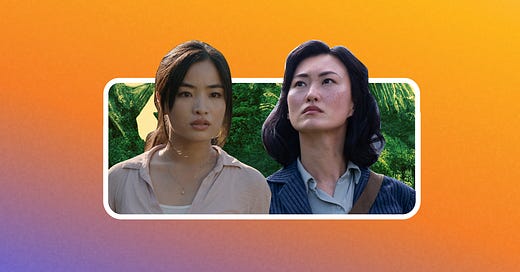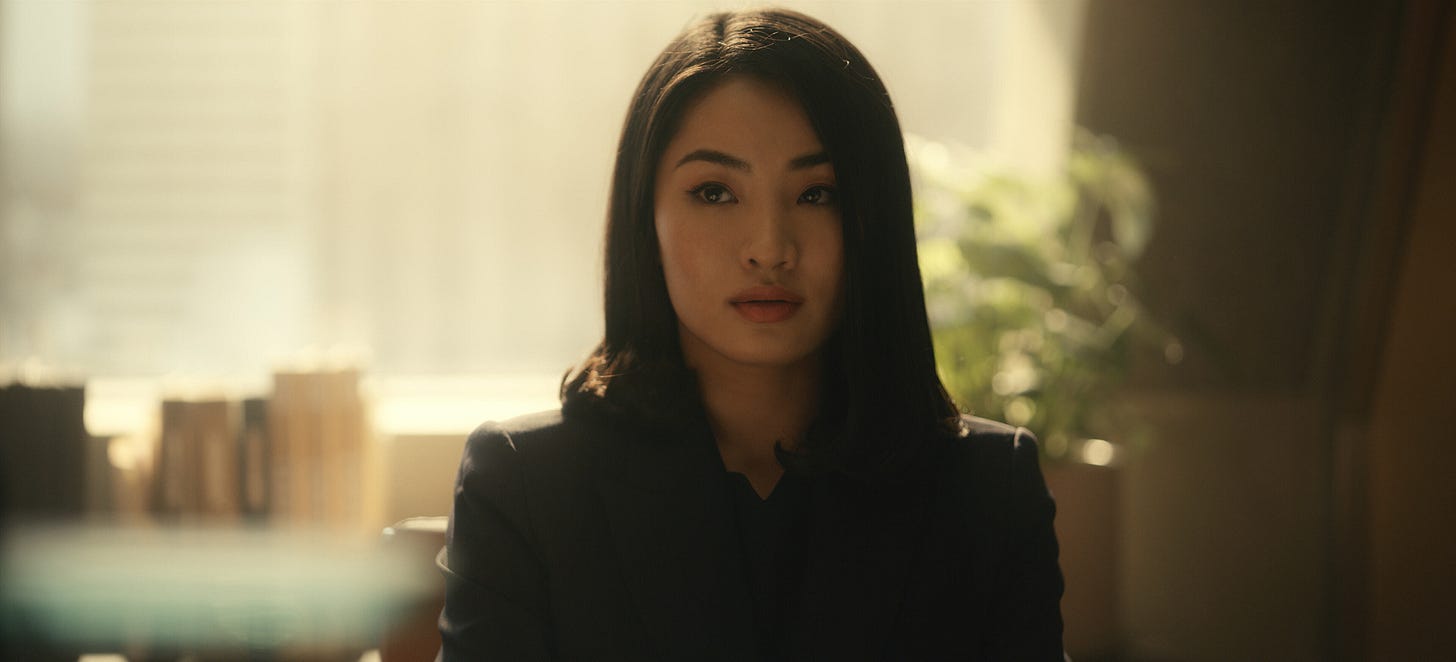Anna Sawai & Mari Yamamoto | Renegades
The AppleTV+ stars discuss shaping the Monsterverse legacy
Welcome to Renegades, a series spotlighting Asian Pacific leaders and creatives who are carving their own paths and defying stereotypes along the way. Starting off the new year are two versatile performers, best known for their work in Pachinko, that now star in Monarch: Legacy of Monsters: Anna Sawai & Mari Yamamoto. We dive deep into the legacy of Japan’s most iconic monster and continue our Gold Talk exclusive conversation regarding Asian representation. The season finale of Monarch: Legacy of Monsters airs January 12 on AppleTV+.
What did you want to be when you were growing up, and how does that compare to what you do today?
Anna Sawai: I remember as a young child I wanted to be like Britney Spears. Once I was in my twenties, I joined a girl band which was the closest thing to Britney I’d be, but my love for acting actually outgrew my desire to be a singer in my teens and that’s what’s brought me where I am. I think being unable to pursue my dreams fully because of other obligations has really given me the drive I have today.
Mari Yamamoto: As a three year old, I had this vision of being in an orchestra and I asked for a violin for my fourth birthday, so I grew up believing I was going to be a violinist. Then, around high school things started to shift and I started wanting to break out of the bubble of the classical world. I joined a Red Hot Chili Peppers cover band as a guitar vocal and started playing sports which I wasn’t allowed to do up till then.
I never stopped playing the violin but after that, my world and interests just kept expanding. I studied International Relations in college and pursued careers in publishing and advertising until I saw Sandra Oh in Grey’s Anatomy, which made me want to act for the first time in my life. Thank God for Sandra Oh.
Anyhow, I very luckily had parents who always encouraged and supported my artistic endeavors and I think I always knew I would end up doing something creative. I explored different mediums and instruments and ended up realizing that using my own mind and body as the instrument allowed me the most creativity, freedom and excitement.
Both of you have lived and worked all over the world. How have your international experiences informed who you are and what you do?
A: For the longest time, I felt like I didn’t exactly fit in in Japan due to my upbringing. I sort of felt like the world outside was cooler. But since working in film, and leaving my home country for months at a time, I’ve come to realize that I’m so Japanese and I love it. I think sometimes you have to distance yourself to appreciate your surroundings and what you have.
M: Having experienced different cultures and becoming bilingual at a young age, I feel as if I’ve always lived in a world of liminality. Home was always more than one place. You don’t ever feel completely whole because you’ve always left a piece of you or something or someone behind. You also feel like you don’t ever really belong somewhere because there’s a whole different world you carry inside of you that people don’t necessarily relate to or understand. But then you eventually learn that you belong to yourself and home is a state of mind, home is other people, not necessarily a place. You also learn how to be whole while being fragmented and that that’s okay, that there’s so much beauty in that.
I think there’s a whole set of sensibilities and skills that stem from these experiences. I also think I try harder to understand, or be an empathetic human being because I know that there are many sides and layers to things that I could never imagine. These are also the things that make me want to act and write. Matt Fraction, one of the co-creators of Monarch: Legacy of Monsters says “writing is an act of radical empathy” and I truly believe that about both writing and acting.
Monarch: Legacy of Monsters is the second series that you have both starred in, with the first being Pachinko. How has it been working on these incredible series which foreground Asian characters and stories?
A: These two shows are so different from one another which makes the experience even more amazing. Naomi in Pachinko represents women who have been sidelined in the workspace. Many Asian countries have been very slow to catch up with feminist movements so it meant a lot to become a voice for those people. Meanwhile, Monarch was a huge deal because we were bringing a show based on a Japanese pop culture icon with Japanese main characters, which probably wouldn’t have happened 10 years ago. It really feels like we’re taking steps forward. I’ve been so lucky and grateful for both these opportunities.
M: Both productions have been special in so many different ways.
Pachinko was my first experience on an American production where many people in front and behind the camera were Asian. Film sets always feel like a big team or a family but on Pachinko I felt this on a whole new level. Soo Hugh and the writers had gifted us this gorgeous script and I think everyone felt this excitement of finally, we get to tell OUR stories on our own terms - There was this incredible energy led by Soo, the directors and producers and this sense of care and pride that we were creating something truly special.
With Monarch: Legacy of Monsters, I can’t really explain how much it means to me as a Japanese actor to get to be a part of Godzilla’s world. Godzilla is such an icon all over the world but in Japan, the character and history carries so much weight and meaning and getting to embody a character from the time period of the original film in the 1950s was such a gift for me. On top of that, to have my character Keiko be the kind of Japanese woman that I have never gotten to see even in contemporary Hollywood films meant so much to me. I often say that I don’t think I would have dared to dream of or write a character like her myself because I still subconsciously have so many preconceived notions of what Japanese/Asian people can be in the US, especially in a period piece. I’m so grateful being a part of this show has made me realize the limitations I was putting on myself, amongst so many other things.
Whether it’s Godzilla, anime, samurai, or Studio Ghibli, it feels like Western audiences’ interest in Japanese content is at an all-time high. What are your thoughts about this cultural moment, and how would you like for it to develop into the future?
A: Again, I’m so proud to be Japanese. It’s so great to see that our art and culture is appreciated. In terms of how I’d like it to develop, I feel there could still be more involvement for Japanese creatives. Oftentimes in the past, they’d take Japanese work and tell it from a Westerner’s point of view. I’d like to see what it would look like if there was more collaboration in the creative process too. The Japanese perspective is very particular so I think it would change things quite a bit.
M: I think it’s so wonderful that stories born in Japan and told from a Japanese POV are traveling and resonating across the world. I do feel that even in my daily life I come across so much interest and fascination with Japanese culture and people. I constantly find myself having these intriguing conversations trying to understand or explain the many contradictions or peculiarities or simply the beauty of it all with both Japanese and non-Japanese people. Even to a person who grew up there, Japan is a source of endless fascination. I’m writing various things set in Japan and my hope is to tell grounded stories that engage audiences in and outside of Japan, so I do hope this appetite for authentic Japanese stories keeps growing.
Anna, in our previous conversation, you gave the advice to stand up for your own opinions and be a self advocate, which can be especially challenging in Asian cultures which often teach us to defer to elders. Could you talk about a time that really showed you the importance of that self advocacy?
A: I didn’t know better back then, but I now realize this big entity brainwashed me by using the “this is what all those who came before you did” card. I was lucky that I got out of that situation, but I feel a lot of people may still be stuck in similar situations because they’re unaware that the companies are just using it on us. We all truly need to stand up and protect ourselves which may eventually lead to protecting others as well.
What are you currently working on that’s exciting you the most?
A: I’m about to start press for SHŌGUN which will be released on Feb 27th on FX. This show embodies all the things I mentioned I hope for regarding the Japanese cultural moment. We really put everything into it and I believe we did it right. I can’t wait to share it with the world.
M: I have multiple writing projects that I’m working on which are all my babies and so exciting to me, but I also am working on birthing a performance art piece with a very close friend who is a phenomenal performance artist so I would say I’m currently most excited about that.
Lightning Round
Daily Habit
A: Start the morning with a warm cup of water
M: Meditation, playing Bach on my violin
Favorite city you’ve visited
A: Kyoto
M: Athens
Favorite emoji
A: 🦭
M: 🫠
Fun Fact
A: I love going on the flying trapeze
M: I have an inexplicable fear of Roman statues
Dream Role
A: Maybe someone from the music industry?!
M: Monarch: Legacy of Monsters was my first time doing anything sci-fi fantasy genre and I absolutely loved it so would love to do more. But I also live for films like Past Lives, quiet life giving and shattering moments. I’ve also primarily lived in drama so I’d love to do more comedy. That being said, one of my dreams is to do a Greek tragedy at the Amphitheater in Epidaurus, Greece. In the end, I think anything that challenges and teaches me something is a dream role.







